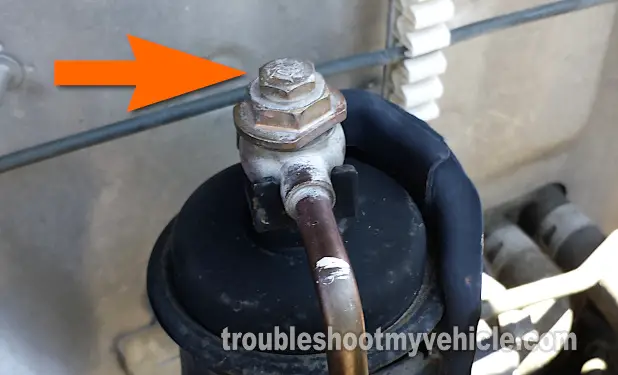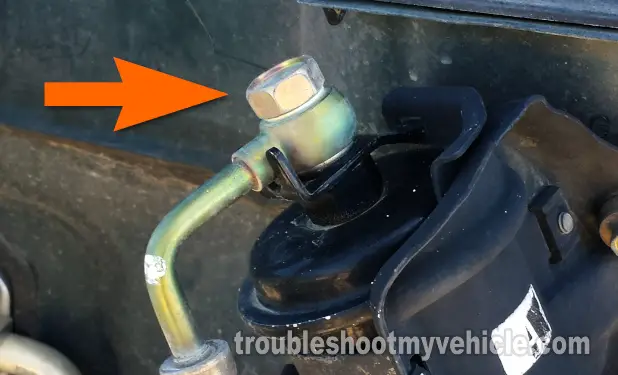TEST 2: Using Starting Fluid To Confirm Lack Of Fuel

Although this test is not the most accurate way of testing a bad fuel pump (causing a no-start problem), it will ‘jump start’ your troubleshooting efforts and narrow down the list of possible bad components.
The idea behind the starting fluid test, is to see if the engine will start after spraying starting fluid into your Civic's engine's throttle body.
But before you do this test, it's crucial that you first check that all four spark plug wires are sparking. You can easily accomplish this by attaching a spark tester to the spark plug wires and having a helper crank the engine (while you observe to see if the spark tester sparks). If the spark plug wires are not sparking, then this test will not work, not to mention that a no spark test result tells you that the problem is in the ignition system.
IMPORTANT: This is a very fast and easy test but you do have to take one very important safety precaution and this is to reconnect the air intake duct after spraying starting fluid down the throttle bore (although you don't have to fasten it). This will prevent any backfire, that might occur, from scaring the heck out of you when cranking the engine.
This is what you have to do:
- 1
Remove the intake air duct from the throttle body. You don't have to completely remove it, since you'll have to reconnect it in one of the next steps.
- 2
Open the throttle plate and spray starting fluid down the bore.
As a safety precaution reconnect the air duct after you have sprayed a good squirt of starting fluid (but you don't have to tighten the air duct's hose clamp). - 3
Crank the engine once the air duct is back on and you're clear of the engine compartment.
- 4
You'll get one of two results with this test:
1.) The engine will start momentarily and after a few seconds will die or.
2.) The engine will only crank but not start at all.
OK, let's find out what your results mean:
CASE 1: If the engine started and ran for a few seconds. This test result tells you that the no-start problem is due to a lack of fuel.
Your next step is to check to see what the fuel pressure is with a fuel pressure test gauge. Go to: TEST 1: Checking Fuel Pressure With A Fuel Pressure Gauge.
CASE 2: The engine did not start, not even momentarily. This usually means that a lack of fuel IS NOT the reason your car is not starting.
Now, remember what I said about this test not being very accurate? Well, I suggest you do one more test and this is to check the fuel pressure with a fuel pressure test gauge. Go to: TEST 1: Checking Fuel Pressure With A Fuel Pressure Gauge.
Type Of Banjo Bolt On Fuel Filter

NOTE: Before you buy a fuel pressure test gauge, you need to find out what type of banjo bolt connects the fuel line (between the fuel filter and fuel injector rail) on your 1.6L Honda Civic. Why? Because the fuel pressure test gauge you may buy may not have the proper fitting to test the fuel pump.
There are two types of banjo bolts used:
- One banjo bolt has a 6mm bolt on top of it (see photo above).
- The other banjo bolt does not have a 6mm bolt on top of it (see photo below).
The ADT Tools 5567 Basic Fuel Injection Pressure Tester will only test Hondas with the 6mm bolt on top of the fuel banjo bolt.
The Great Neck OEM 27167 Fuel Pressure Test Kit and the Wilmar W89726 Master Fuel Injection Test Kit will test all Hondas regardless of the type of banjo bolt.

Where To Buy The Fuel Pump And Save
The fuel pump in your 1.6L Honda Civic is located inside the fuel tank. The fuel pump can be bought in any auto parts store, but I think you'll find the better price online. The following fuel pumps are pretty good deals:
Not sure if the above fuel pumps fit your particular 1.6L Honda Civic? Don't worry, once you get to the site, they'll make sure it fits by asking you the specifics of your vehicle. If it doesn't fit, they'll find you the right one.
More 1.6L Civic Tutorials
You can find a complete list of tutorials and wiring diagrams in this index:
Here's a small sample of the 1.6L Honda Civic tutorials you'll find in the index:
- Testing Shift Control Solenoid Valves A and B (1996-2000 1.6L Honda Civic).
- How To Test The Alternator (1996-2000 1.6L Honda Civic).
- How To Test: Lock-up Control Solenoid Valves (1996-2000 1.6L Honda Civic).
- How To Test Trouble Code P0135 (1995-2000 Honda 1.6L).
- How To Test The Igniter, Ignition Coil Accord, Civic, CRV, and Odyssey (at:easyautodiagnostics.com).

If this info saved the day, buy me a beer!





